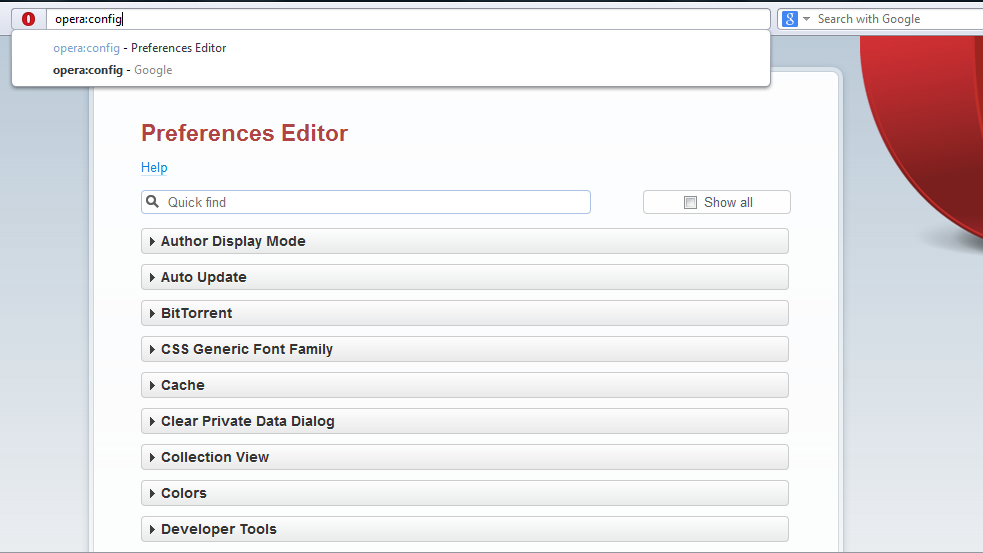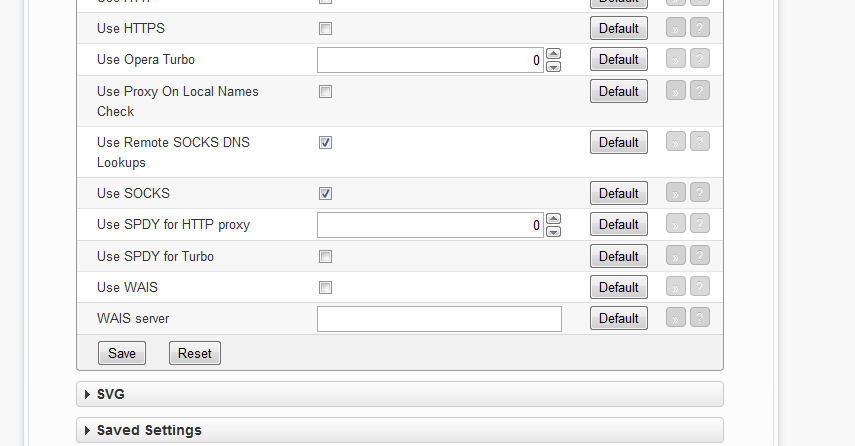Important Notice - Outdated Guide
This guide applies to Opera 12 and earlier (pre-2013), which had built-in torrent client and advanced proxy settings. Modern Opera versions:
- No longer include a built-in torrent client
- Use system-wide proxy settings instead
- Based on Chromium engine since 2013
For current proxy setup, see our modern alternatives section below.
This legacy guide documents how to configure SOCKS5 proxy in Opera 12 and earlier versions, which featured a built-in torrent client and advanced proxy configuration through opera:config. While these versions are obsolete, this guide is preserved for historical reference.
Legacy Opera Features (Pre-2013)
Opera 12 and earlier offered unique features that were removed in later versions:
- Built-in BitTorrent client for direct torrent downloads
- Advanced proxy configuration via opera:config
- Independent proxy settings (not system-wide)
- Native SOCKS5 support with authentication
- Presto rendering engine (not Chromium)
Legacy Configuration Steps
Step 1: Access Advanced Configuration
In Opera 12 or earlier, type opera:config in the address bar and press Enter. This opens the advanced preference editor.
Scroll down to find the Proxy section and select it.

Step 2: Configure SOCKS Proxy
In the proxy configuration section:
- Leave all entries above SOCKS blank (except "Opera Turbo Config File")
- SOCKS server: Enter server and port (e.g.,
proxy.torguard.org:1080) - SOCKS password: Your TorGuard proxy password
- SOCKS username: Your TorGuard proxy username

Step 3: Enable SOCKS Options
Scroll down and enable these critical options:
- ✓ Use Remote SOCKS DNS Lookups (prevents DNS leaks)
- ✓ Use SOCKS (activates the proxy)
Click Save to apply the configuration.

Modern Alternatives
Current Opera (Chromium-based)
Modern Opera uses system proxy settings. To use a proxy:
- Configure proxy at the system level (Windows/macOS/Linux settings)
- Use Opera's built-in VPN feature (free, but limited)
- Install proxy extensions from Opera Add-ons store
- Use the TorGuard Chrome extension (compatible with Opera)
Recommended Modern Solutions
| Solution | Description | Best For |
|---|---|---|
| TorGuard Browser Extension | Easy proxy switching for Chrome/Opera | Browser-only proxy needs |
| System Proxy Settings | Configure proxy for all applications | System-wide protection |
| Proxifier/ProxyCap | Per-application proxy routing | Advanced proxy management |
| Dedicated Torrent Client | qBittorrent, Deluge with proxy support | Torrent downloads |
Setting Up Proxy in Modern Opera
Option 1: Using System Proxy
Modern Opera respects system proxy settings:
- Windows: Settings → Network & Internet → Proxy
- macOS: System Preferences → Network → Advanced → Proxies
- Linux: Network Settings → Network Proxy
Option 2: TorGuard Browser Extension
- Visit Opera Add-ons store
- Search for proxy management extensions
- Install TorGuard's Chrome extension (Opera compatible)
- Configure with your proxy credentials
For Torrent Downloads
Since modern Opera no longer includes a torrent client, use dedicated torrent software with proxy support:
Security Considerations
Important Security Notes
- Legacy Opera versions have unpatched security vulnerabilities
- Modern websites may not display correctly in Opera 12
- SSL/TLS support is outdated in legacy versions
- Always use current browser versions for security
- Consider VPN service for comprehensive protection
Why This Changed
Opera's transition in 2013 brought significant changes:
- Engine Switch: From proprietary Presto to open-source Chromium
- Feature Removal: Torrent client, email client, and advanced customization removed
- Standardization: Aligned with Chrome's extension ecosystem
- Performance: Improved speed and compatibility
- Maintenance: Easier to maintain and update
For modern proxy configuration needs or assistance with current Opera versions, please contact our support team.